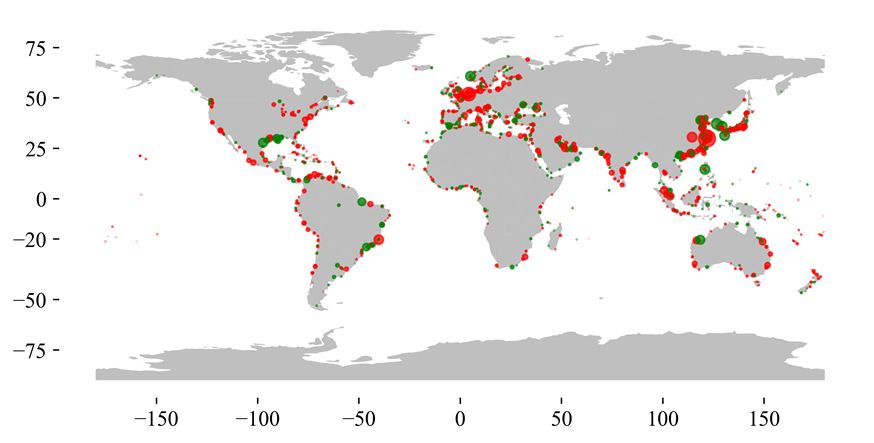Archives
Freight News
Covid slices 10% off global trade, say researchers
[ April 14, 2021 // Chris ]Global maritime trade fell by up to 10% in the first eight months of 2020 with losses of up to $412 billion, according to Oxford research published on 14 April, which used algorithms and tracking data to follow 100,000 vessels.
The Oxford team, led by Jasper Verschuur a graduate student in the Environmental Change Institute n(ECI), showed the largest absolute losses were in ports in China, the Middle East and Western Europe – which experienced both supply and demand shocks during the first few months.
The most resilient sectors are found to be the textiles (-4.1%), food and beverages (-5.8%) and wood and paper manufacturing (-6.3%).
ECI’s Professor Jim Hall said: “Looking at this satellite ship-tracking data during the COVID-19 pandemic is fascinating and alarming. You can see how national lockdowns have had impacts far beyond many countries’ borders, through big shifts in the patterns of shipping trade. Never before have we been able to see, so precisely and so quickly, how an economic shock ripples through supply chains around the world.”
Small and developing nations were particularly hard-hit, Hall added: “The largest percentage change in imports are associated with small economies such as Turks and Caicos Islands, Bahrain, Anguilla, Federated States of Micronesia and Madagascar.”
Jasper Verschuur added: “We can measure the economic impacts of the COVID-19 on a global scale in almost real time. Going further, we can use a similar approach to monitor how countries recovery from the pandemic as they rebuild their economies, and identify where additional financial support is needed.”

<!– /* Font Definitions */ @font-face {font-family:Calibri; panose-1:2 15 5 2 2 2 4 3 2 4; mso-font-charset:0; mso-generic-font-family:swiss; mso-font-pitch:variable; mso-font-signature:-469750017 -1073732485 9 0 511 0;} /* Style Definitions */ p.MsoNormal, li.MsoNormal, div.MsoNormal {mso-style-unhide:no; mso-style-qformat:yes; mso-style-parent:””; margin-top:0cm; margin-right:0cm; margin-bottom:10.0pt; margin-left:0cm; line-height:115%; mso-pagination:widow-orphan; font-size:11.0pt; font-family:”Calibri”,”sans-serif”; mso-ascii-font-family:Calibri; mso-ascii-theme-font:minor-latin; mso-fareast-font-family:Calibri; mso-fareast-theme-font:minor-latin; mso-hansi-font-family:Calibri; mso-hansi-theme-font:minor-latin; mso-bidi-font-family:”Times New Roman”; mso-bidi-theme-font:minor-bidi; mso-fareast-language:EN-US;} .MsoChpDefault {mso-style-type:export-only; mso-default-props:yes; font-family:”Calibri”,”sans-serif”; mso-ascii-font-family:Calibri; mso-ascii-theme-font:minor-latin; mso-fareast-font-family:Calibri; mso-fareast-theme-font:minor-latin; mso-hansi-font-family:Calibri; mso-hansi-theme-font:minor-latin; mso-bidi-font-family:”Times New Roman”; mso-bidi-theme-font:minor-bidi; mso-fareast-language:EN-US;} .MsoPapDefault {mso-style-type:export-only; margin-bottom:10.0pt; line-height:115%;} @page WordSection1 {size:612.0pt 792.0pt; margin:72.0pt 72.0pt 72.0pt 72.0pt; mso-header-margin:36.0pt; mso-footer-margin:36.0pt; mso-paper-source:0;} div.WordSection1 {page:WordSection1;} –>
Change in port-level trade (volume) in 2020 relative to 2019 (Jan-Aug). Red is negative, green is positive












